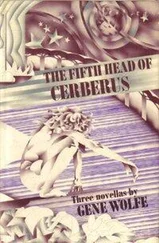“I’m delighted.”
“You’re surprised too. Your eyes get big when you’re surprised; did you know that?”
“I am surprised. I’ve come here looking for you several times, but you haven’t been here.”
“We’ve come looking for you, and you haven’t been here either, but I suppose one can’t really spend a great deal of time in a park.”
“I would have,” I said, “if I’d known you were looking for me. I went here as much as I could anyway. I was afraid that she”—I jerked my head at the monster—“wouldn’t let you come back. How did you persuade her?”
“I didn’t,” Phaedria said. “Can’t you guess? Don’t you know anything?”
I confessed that I did not. I felt stupid, and I was stupid, at least in the things I said, because so much of my mind was caught up not in formulating answers to her remarks but in committing to memory the lilt of her voice, the purple of her eyes, even the faint perfume of her skin and the soft, warm touch of her breath on my cool cheek.
“So you see,” Phaedria was saying, “that’s how it is with me. When Aunt Uranie—she’s only a poor cousin of mother’s, really—got home and told him about you he found out who you are, and here I am.”
“Yes,” I said, and she laughed.
Phaedria was one of those girls raised between the hope of marriage and the thought of sale. Her father’s affairs, as she herself said, were “unsettled.” He speculated in ship cargoes, mostly from the south—textiles and drugs. He owned, most of the time, large sums which the lenders could not hope to collect unless they were willing to allow him more to recoup. He might die a pauper, but in the meantime he had raised his daughter with every detail of education and plastic surgery attended to. If when she reached marriageable age he could afford a good dowry, she would link him with some wealthy family. If he was pressed for money instead, a girl so reared would bring fifty times the price of a common street child. Our family, of course, would be ideal for either purpose.
“Tell me about your house,” she said. “Do you know what the kids call it? ‘The Cave Canem,’ or sometimes just ‘The Cave.’ The boys all think it’s a big thing to have been there and they lie about it. Most of them haven’t.”
But I wanted to talk about Dr. Marsch and the sciences of Earth, and I was nearly as anxious to find out about her own world, “the kids” she mentioned so casually, her school and family, as she was to learn about us. Also, although I was willing to detail the services my father’s girls rendered their benefactors, there were some things, such as my aunt’s floating down the stairwell, that I was adverse to discussing. But we bought egg rolls from the same old woman to eat in the chill sunlight and exchanged confidences and somehow parted not only lovers but friends, promising to meet again the next day.
At some time during the night, I believe at almost the same time that I returned—or to speak more accurately was returned , since I could scarcely walk—to my bed after a session of hours with my father, the weather changed. The musked exhalation of late spring or early summer crept through the shutters, and the fire in our little grate seemed to extinguish itself for shame almost at once. My father’s valet opened the window for me and there poured into the room that fragrance that tells of the melting of the last snows beneath the deepest and darkest evergreens on the north sides of mountains. I had arranged with Phaedria to meet at ten, and before going to my father’s library I had posted a note on the escritoire beside my bed, asking that I be awakened an hour earlier; and that night I slept with the fragrance in my nostrils and the thought—half plan, half dream—in my mind that by some means Phaedria and I would elude her aunt entirely and find a deserted lawn where blue and yellow flowers dotted the short grass.
When I woke, it was an hour past noon and rain drove in sheets past the window. Mr. Million, who was reading a book on the far side of the room, told me that it had been raining like that since six and for that reason he had not troubled to wake me. I had a splitting headache, as I often did after a long session with my father, and took one of the powders he had prescribed to relieve it. They were gray, and smelled of anise.
“You look unwell,” Mr. Million said.
“I was hoping to go to the park.”
“I know.” He rolled across the room toward me, and I recalled that Dr. Marsch had called him an unbound simulator. For the first time since I had satisfied myself about them when I was quite small, I bent over (at some cost to my head) and read the almost obliterated stampings on his main cabinet. There was only the name of a cybernetics company on Earth and, in French as I had always supposed, his name: M. Million— “Monsieur” or “Mister” Million. Then, as startling as a blow from behind to a man musing in a comfortable chair, I remembered that a dot was employed in some algebras for multiplication. He saw my change of expression at once. “A thousand-million-word core capacity,” he said. “An English billion or a French milliard, the M being the Roman numeral for one thousand, of course. I thought you understood that some time ago.”
“You are an unbound simulator. What is a bound simulator, and whom are you simulating—my father?”
“No.” The face in the screen, Mr. Million’s face as I had always thought of it, shook its head. “Call me, call the person simulated, at least, your great-grandfather. He—I—am dead. In order to achieve simulation, it is necessary to examine the cells of the brain, layer by layer, with a beam of accelerated particles so that the neural patterns can be reproduced, we say ‘core imaged,’ in the computer. The process is fatal.”
I asked after a moment, “And a bound simulator?”
“If the simulation is to have a body that looks human the mechanical body must be linked—‘bound’—to a remote core, since the smallest billion-word core cannot be made even approximately as small as a human brain.” He paused again, and for an instant his face dissolved into myriad sparkling dots, swirling like dust motes in a sunbeam. “I am sorry. For once you wish to listen, but I do not wish to lecture. I was told, a very long time ago, just before the operation, that my simulation—this—would be capable of emotion in certain circumstances. Until today I had always thought they lied.” I would have stopped him if I could, but he rolled out of the room before I could recover from my surprise.
For a long time, I suppose an hour or more, I sat listening to the drumming of the rain and thinking about Phaedria and about what Mr. Million had said, all of it confused with my father’s questions of the night before, questions which had seemed to steal their answers from me so that I was empty, and dreams had come to flicker in the emptiness, dreams of fences and walls and the concealing ditches called ha-has, that contain a barrier you do not see until you are about to tumble on it. Once I had dreamed of standing in a paved court fenced with Corinthian pillars so close set that I could not force my body between them, although in the dream I was only a child of three or four. After trying various places for a long time, I had noticed that each column was carved with a word—the only one that I could remember was carapace —and that the paving stones of the courtyard were mortuary tablets like those set into the floors in some of the old French churches, with my own name and a different date on each.
This dream pursued me even when I tried to think of Phaedria, and when a maid brought me hot water—for I now shaved twice a week—I found that I was already holding my razor in my hand, and had in fact cut myself with it so that the blood had streaked my nightclothes and run down onto the sheets.
Читать дальше










